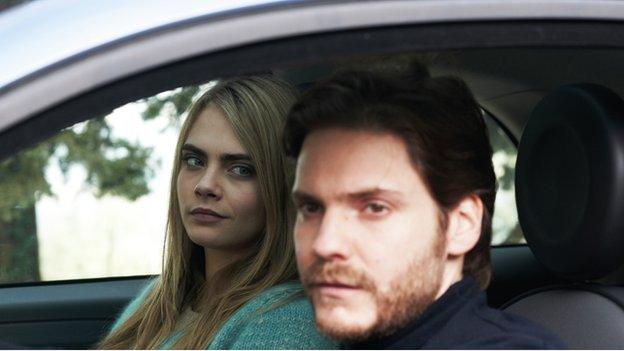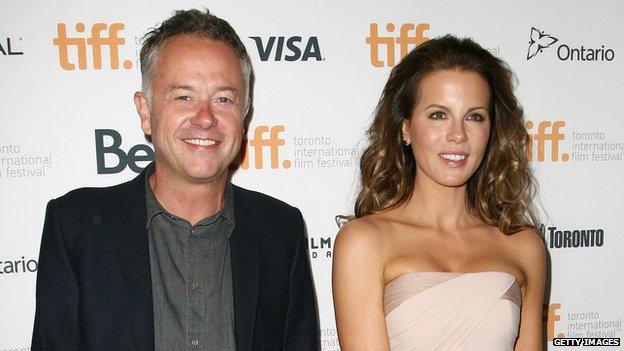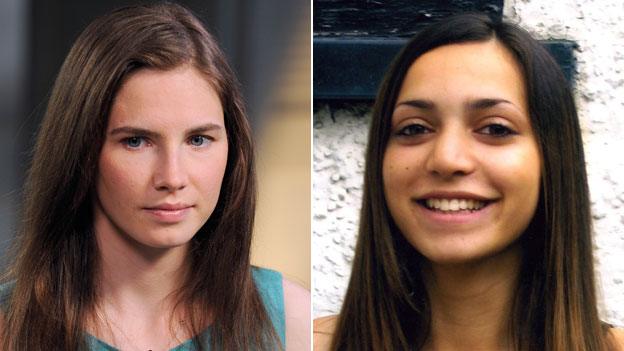Meredith Kercher drama tackled on big screen
- Published

Model Cara Delevingne appears in The Face of an Angel with Daniel Bruhl
Inspired by the murder of British student Meredith Kercher, Michael Winterbottom's The Face of an Angel - which has had its world premiere at the Toronto Film Festival - explores the media and public's obsession with violent stories.
The small town of Perugia in Italy was shocked when Meredith Kercher was killed in 2007.
The nature of her murder and the subsequent trial of US student Amanda Knox and her Italian ex-boyfriend Raffaele Sollecito brought the case to the attention of the world's media.
The case has remained in the public eye ever since, with guilty verdicts, acquittals and reinstated verdicts dominating the headlines.
The story inspired British director Michael Winterbottom to make his latest film, based on the 2010 book Angel Face by US journalist Barbie Latza Nadeau.
The book offers her account of the trial, but the film is not a retelling of actual events, nor an opinion on the verdict.
'Good starting point'
Speaking at the Toronto Film Festival, Winterbottom - who previously directed Steve Coogan in The Trip and 24 Hour Party People - said he was "never interested in making a straight reconstruction".
"This is a case where you've got American, British and Italian press all giving different perspectives on the story. There's massive amounts of interest and coverage," he said.
"After meeting Barbie in Rome, I felt like maybe using the journalist would be a good starting point for [questioning] why the media is so obsessed with murder and these kinds of stories and trials."
The film, which will screen at the London Film Festival in October, focuses on Thomas Lang (Daniel Bruhl), a film director offered the chance to adapt a book by US reporter Simone Ford (Kate Beckinsale).

Kate Beckinsale joined Michael Winterbottom at the film's Toronto premiere
The book recounts the Siena trial of an American student, here named Jessica Fuller, for the murder of her flatmate, one Elizabeth Pryce.
Ford takes Lang behind the story of the trial, meeting with the journalists embedded in the case and others involved.
Despite evident parallels to his own experience researching the film, however, Winterbottom stressed that the resulting feature is not a documentary of that experience and the character of Lang is not autobiographical.
“Where we could borrow things we did," he went on. "After I met Barbie, I also met other journalists in Rome and we went up to the first day of the appeal in Perugia.
"But the structure of the film is it starts off as one type of film - it begins with a murder trial - and then evolves from that.
'A lot of parallels'
"There are a lot of parallels between the film Thomas Lang is trying to make and our film, but ours isn't the one Thomas is trying to make.
"One of the differences is his financiers want a film about the two girls and the murder case so he doesn't make it - whereas we did make ours, so clearly our financiers were more relaxed about it."
British fashion model Cara Delevingne also stars in the film as its only truly fictional character - a carefree British student named Melanie who is studying in Italy.
She serves as a parallel to both the student who was murdered and the one on trial, who inspires Lang to make a film about love and innocence rather than violence and crime.
Winterbottom said the model's lack of acting experience was not a consideration when casting. Nor was he worried her own media profile would overshadow the content of the film.

Neither Amanda Knox (l) nor Meredith Kercher are mentioned by name in the film
"The role of Melanie is really important. I met lots of people for the role, and as soon as I met Cara I thought she would be great.
"She's someone who had energy and optimism, of wanting to enjoy life."
Having been exposed to the world and working practices of journalists, the director said his opinion of the profession has not changed much from what it was before he began his research.
"I like journalism, but I think the way the media works in general means journalists have to do things that are not necessarily the right things to do,” he told the BBC News website.
"On the first day of the trial, there were hundreds of journalists around. Everyone was racing when they arrived at court, and the big story was the colour of [Amanda Knox's] skirt and the length of her hair.
"It’s an incredible shame, given journalism is so important as to how we see and understand the world. We had 400 really intelligent people running around, only to tell you the colour of her skirt.
"They could be telling much more interesting stories than that."
The Face of an Angel will be released in the UK in 2015.